Gibbs Cycle Reflection: Cultural Sensitivity in Nursing Practice
VerifiedAdded on 2021/01/01
|9
|964
|179
Journal and Reflective Writing
AI Summary
This assignment presents a Gibbs Cycle reflection on the student's experience and understanding of cultural sensitivity within the healthcare context, specifically focusing on the Aboriginal and Torres Strait Islander people. The reflection explores the student's initial descriptions, feelings, and evaluations regarding cultural differences and stereotypes, emphasizing the impact of pre-conceived notions and the importance of ethical behavior. The analysis delves into the reasons behind stereotypes and the need for cultural education and understanding. The conclusion highlights the importance of early education and professional conduct, with an action plan to implement strategies for promoting equality and respect through education and training programs. The reflection references relevant literature to support the student's insights and recommendations, demonstrating a commitment to improving healthcare practices and addressing social stigmas related to cultural diversity.
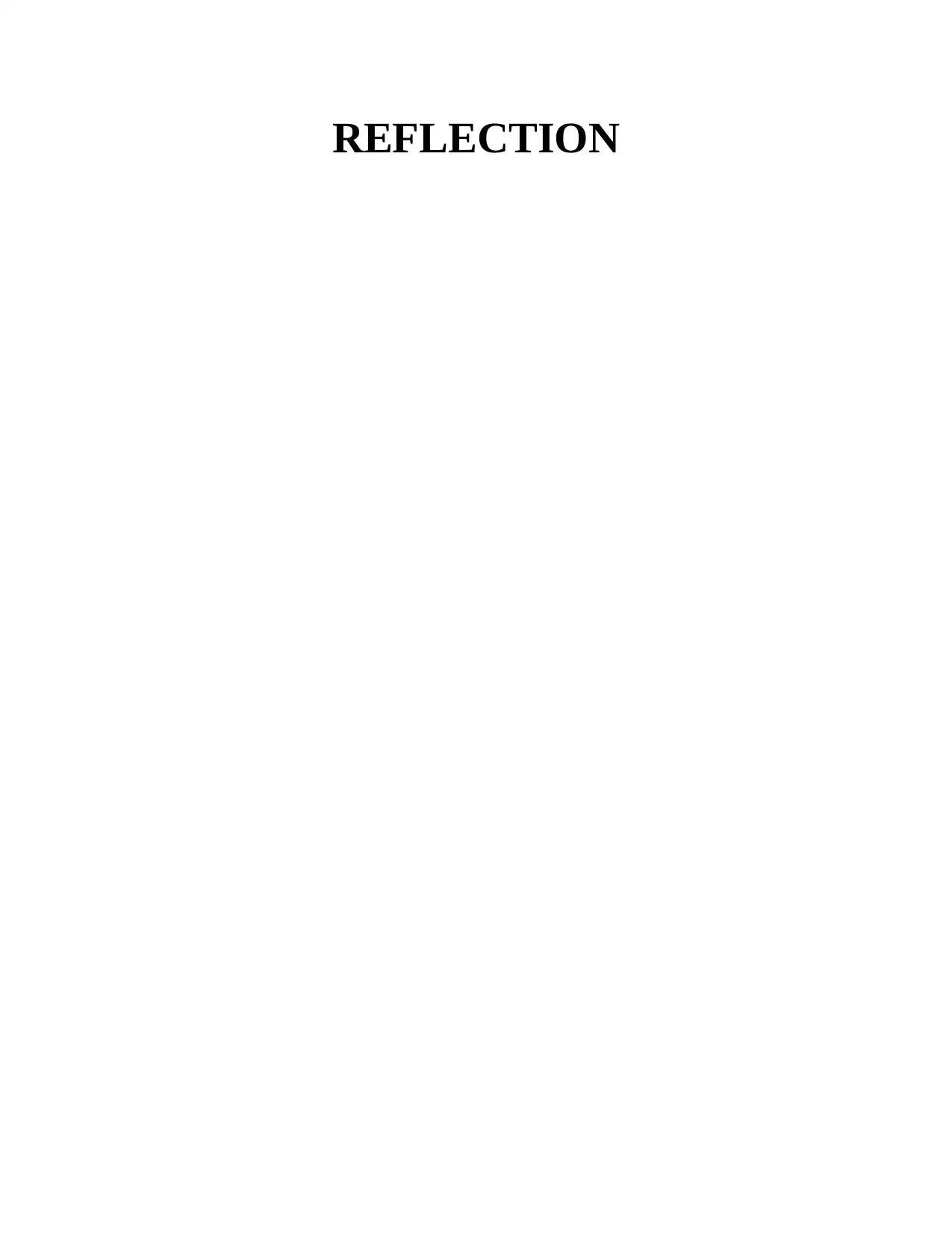
REFLECTION
Paraphrase This Document
Need a fresh take? Get an instant paraphrase of this document with our AI Paraphraser
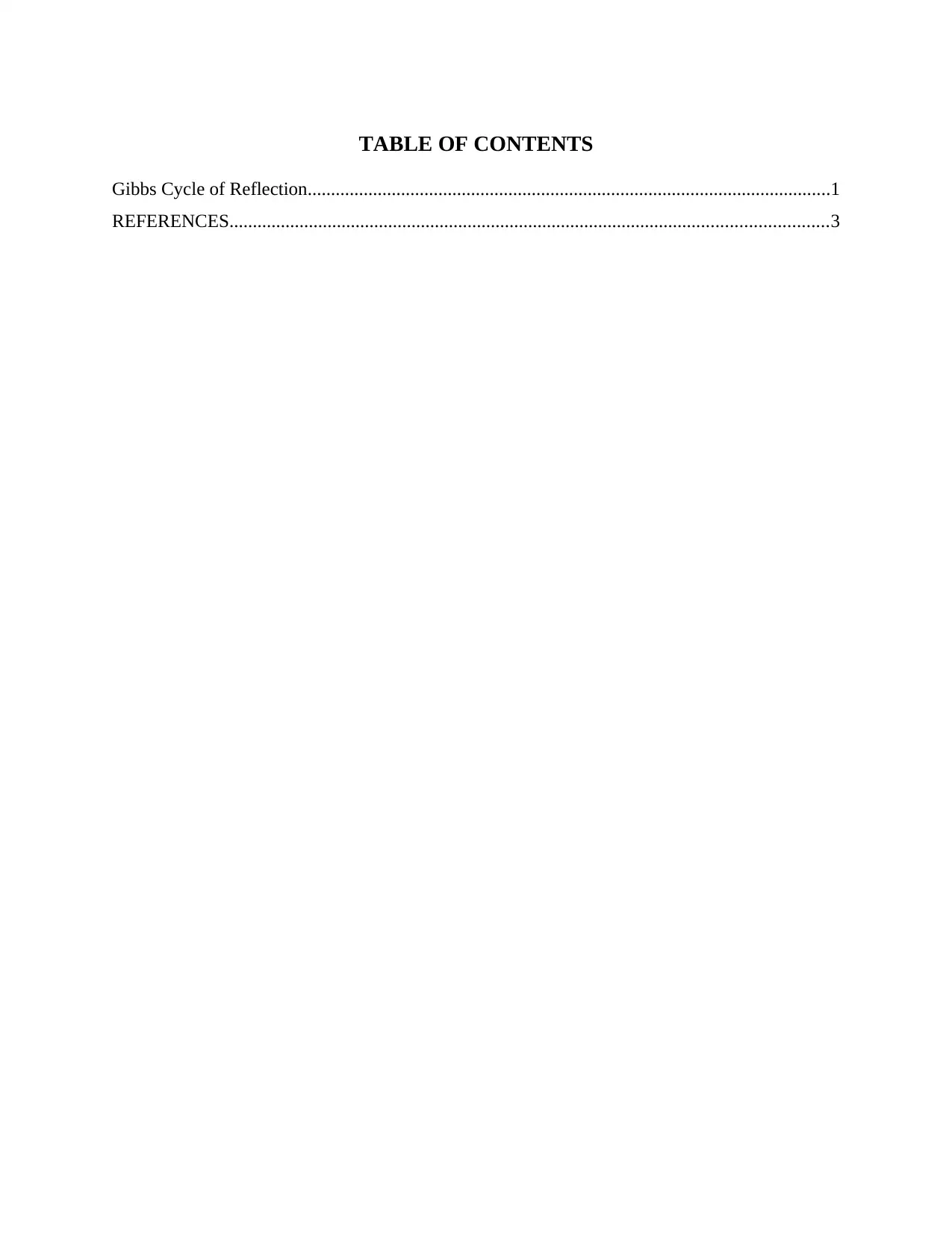
TABLE OF CONTENTS
Gibbs Cycle of Reflection................................................................................................................1
REFERENCES................................................................................................................................3
Gibbs Cycle of Reflection................................................................................................................1
REFERENCES................................................................................................................................3
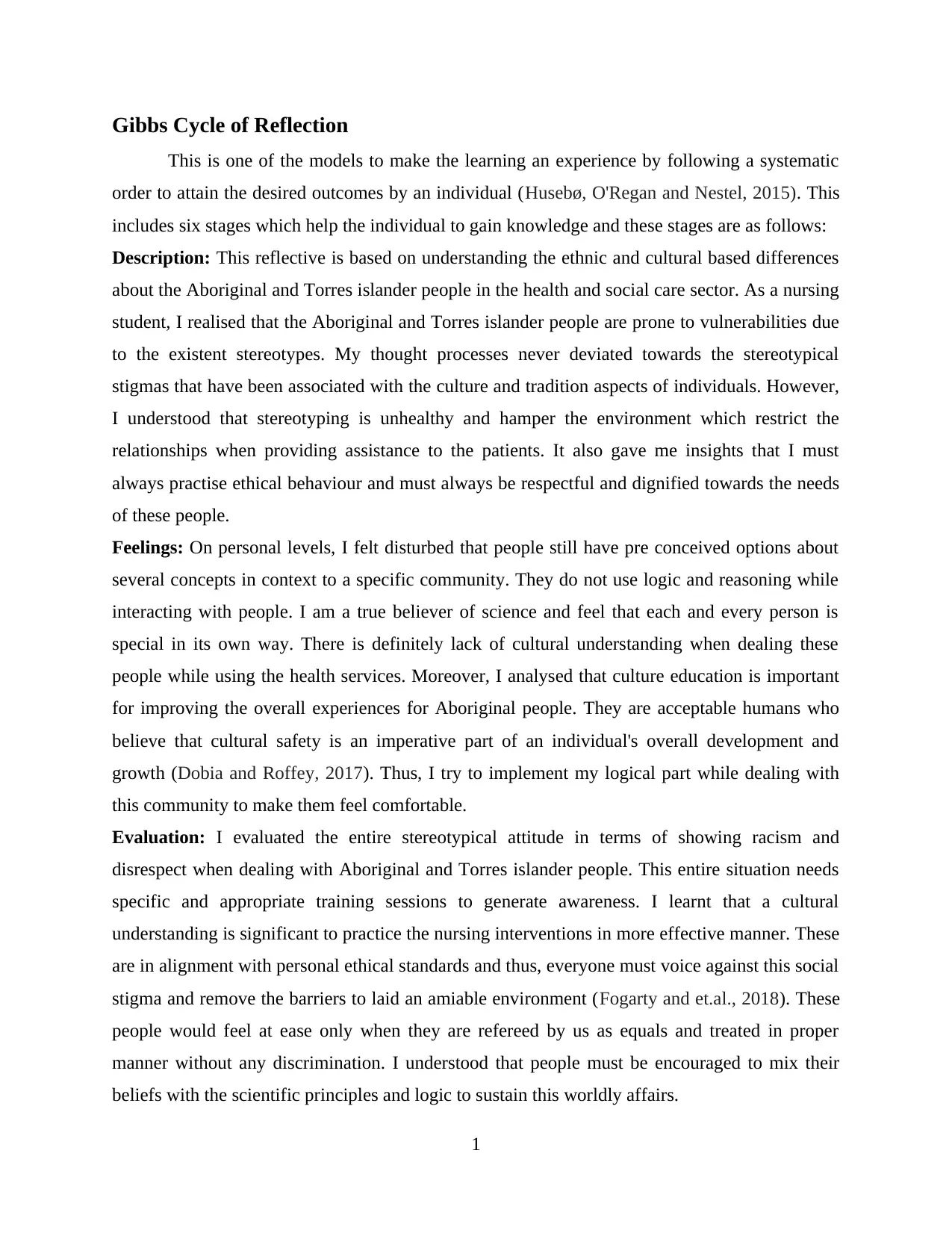
Gibbs Cycle of Reflection
This is one of the models to make the learning an experience by following a systematic
order to attain the desired outcomes by an individual (Husebø, O'Regan and Nestel, 2015). This
includes six stages which help the individual to gain knowledge and these stages are as follows:
Description: This reflective is based on understanding the ethnic and cultural based differences
about the Aboriginal and Torres islander people in the health and social care sector. As a nursing
student, I realised that the Aboriginal and Torres islander people are prone to vulnerabilities due
to the existent stereotypes. My thought processes never deviated towards the stereotypical
stigmas that have been associated with the culture and tradition aspects of individuals. However,
I understood that stereotyping is unhealthy and hamper the environment which restrict the
relationships when providing assistance to the patients. It also gave me insights that I must
always practise ethical behaviour and must always be respectful and dignified towards the needs
of these people.
Feelings: On personal levels, I felt disturbed that people still have pre conceived options about
several concepts in context to a specific community. They do not use logic and reasoning while
interacting with people. I am a true believer of science and feel that each and every person is
special in its own way. There is definitely lack of cultural understanding when dealing these
people while using the health services. Moreover, I analysed that culture education is important
for improving the overall experiences for Aboriginal people. They are acceptable humans who
believe that cultural safety is an imperative part of an individual's overall development and
growth (Dobia and Roffey, 2017). Thus, I try to implement my logical part while dealing with
this community to make them feel comfortable.
Evaluation: I evaluated the entire stereotypical attitude in terms of showing racism and
disrespect when dealing with Aboriginal and Torres islander people. This entire situation needs
specific and appropriate training sessions to generate awareness. I learnt that a cultural
understanding is significant to practice the nursing interventions in more effective manner. These
are in alignment with personal ethical standards and thus, everyone must voice against this social
stigma and remove the barriers to laid an amiable environment (Fogarty and et.al., 2018). These
people would feel at ease only when they are refereed by us as equals and treated in proper
manner without any discrimination. I understood that people must be encouraged to mix their
beliefs with the scientific principles and logic to sustain this worldly affairs.
1
This is one of the models to make the learning an experience by following a systematic
order to attain the desired outcomes by an individual (Husebø, O'Regan and Nestel, 2015). This
includes six stages which help the individual to gain knowledge and these stages are as follows:
Description: This reflective is based on understanding the ethnic and cultural based differences
about the Aboriginal and Torres islander people in the health and social care sector. As a nursing
student, I realised that the Aboriginal and Torres islander people are prone to vulnerabilities due
to the existent stereotypes. My thought processes never deviated towards the stereotypical
stigmas that have been associated with the culture and tradition aspects of individuals. However,
I understood that stereotyping is unhealthy and hamper the environment which restrict the
relationships when providing assistance to the patients. It also gave me insights that I must
always practise ethical behaviour and must always be respectful and dignified towards the needs
of these people.
Feelings: On personal levels, I felt disturbed that people still have pre conceived options about
several concepts in context to a specific community. They do not use logic and reasoning while
interacting with people. I am a true believer of science and feel that each and every person is
special in its own way. There is definitely lack of cultural understanding when dealing these
people while using the health services. Moreover, I analysed that culture education is important
for improving the overall experiences for Aboriginal people. They are acceptable humans who
believe that cultural safety is an imperative part of an individual's overall development and
growth (Dobia and Roffey, 2017). Thus, I try to implement my logical part while dealing with
this community to make them feel comfortable.
Evaluation: I evaluated the entire stereotypical attitude in terms of showing racism and
disrespect when dealing with Aboriginal and Torres islander people. This entire situation needs
specific and appropriate training sessions to generate awareness. I learnt that a cultural
understanding is significant to practice the nursing interventions in more effective manner. These
are in alignment with personal ethical standards and thus, everyone must voice against this social
stigma and remove the barriers to laid an amiable environment (Fogarty and et.al., 2018). These
people would feel at ease only when they are refereed by us as equals and treated in proper
manner without any discrimination. I understood that people must be encouraged to mix their
beliefs with the scientific principles and logic to sustain this worldly affairs.
1
⊘ This is a preview!⊘
Do you want full access?
Subscribe today to unlock all pages.

Trusted by 1+ million students worldwide
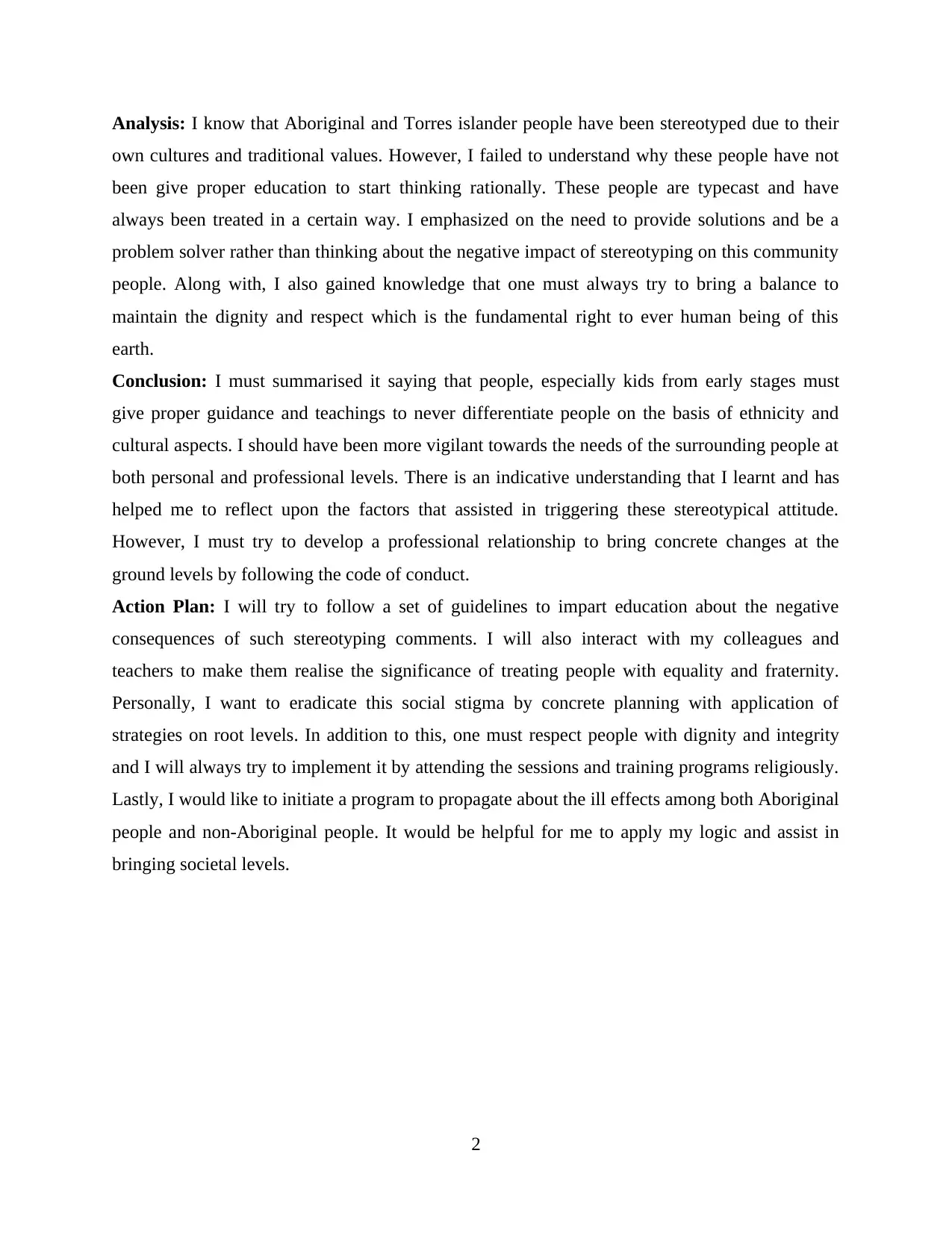
Analysis: I know that Aboriginal and Torres islander people have been stereotyped due to their
own cultures and traditional values. However, I failed to understand why these people have not
been give proper education to start thinking rationally. These people are typecast and have
always been treated in a certain way. I emphasized on the need to provide solutions and be a
problem solver rather than thinking about the negative impact of stereotyping on this community
people. Along with, I also gained knowledge that one must always try to bring a balance to
maintain the dignity and respect which is the fundamental right to ever human being of this
earth.
Conclusion: I must summarised it saying that people, especially kids from early stages must
give proper guidance and teachings to never differentiate people on the basis of ethnicity and
cultural aspects. I should have been more vigilant towards the needs of the surrounding people at
both personal and professional levels. There is an indicative understanding that I learnt and has
helped me to reflect upon the factors that assisted in triggering these stereotypical attitude.
However, I must try to develop a professional relationship to bring concrete changes at the
ground levels by following the code of conduct.
Action Plan: I will try to follow a set of guidelines to impart education about the negative
consequences of such stereotyping comments. I will also interact with my colleagues and
teachers to make them realise the significance of treating people with equality and fraternity.
Personally, I want to eradicate this social stigma by concrete planning with application of
strategies on root levels. In addition to this, one must respect people with dignity and integrity
and I will always try to implement it by attending the sessions and training programs religiously.
Lastly, I would like to initiate a program to propagate about the ill effects among both Aboriginal
people and non-Aboriginal people. It would be helpful for me to apply my logic and assist in
bringing societal levels.
2
own cultures and traditional values. However, I failed to understand why these people have not
been give proper education to start thinking rationally. These people are typecast and have
always been treated in a certain way. I emphasized on the need to provide solutions and be a
problem solver rather than thinking about the negative impact of stereotyping on this community
people. Along with, I also gained knowledge that one must always try to bring a balance to
maintain the dignity and respect which is the fundamental right to ever human being of this
earth.
Conclusion: I must summarised it saying that people, especially kids from early stages must
give proper guidance and teachings to never differentiate people on the basis of ethnicity and
cultural aspects. I should have been more vigilant towards the needs of the surrounding people at
both personal and professional levels. There is an indicative understanding that I learnt and has
helped me to reflect upon the factors that assisted in triggering these stereotypical attitude.
However, I must try to develop a professional relationship to bring concrete changes at the
ground levels by following the code of conduct.
Action Plan: I will try to follow a set of guidelines to impart education about the negative
consequences of such stereotyping comments. I will also interact with my colleagues and
teachers to make them realise the significance of treating people with equality and fraternity.
Personally, I want to eradicate this social stigma by concrete planning with application of
strategies on root levels. In addition to this, one must respect people with dignity and integrity
and I will always try to implement it by attending the sessions and training programs religiously.
Lastly, I would like to initiate a program to propagate about the ill effects among both Aboriginal
people and non-Aboriginal people. It would be helpful for me to apply my logic and assist in
bringing societal levels.
2
Paraphrase This Document
Need a fresh take? Get an instant paraphrase of this document with our AI Paraphraser
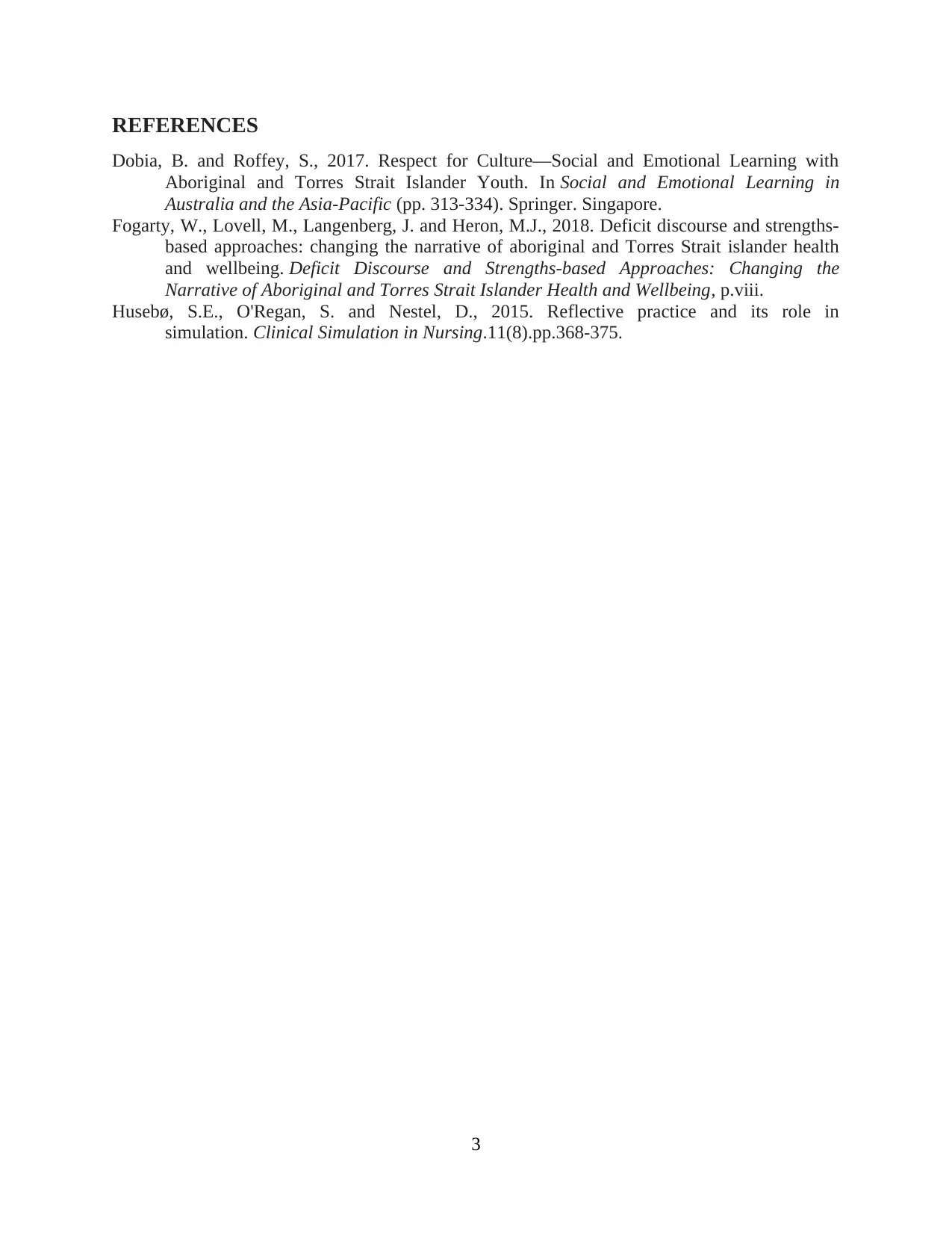
REFERENCES
Dobia, B. and Roffey, S., 2017. Respect for Culture—Social and Emotional Learning with
Aboriginal and Torres Strait Islander Youth. In Social and Emotional Learning in
Australia and the Asia-Pacific (pp. 313-334). Springer. Singapore.
Fogarty, W., Lovell, M., Langenberg, J. and Heron, M.J., 2018. Deficit discourse and strengths-
based approaches: changing the narrative of aboriginal and Torres Strait islander health
and wellbeing. Deficit Discourse and Strengths-based Approaches: Changing the
Narrative of Aboriginal and Torres Strait Islander Health and Wellbeing, p.viii.
Husebø, S.E., O'Regan, S. and Nestel, D., 2015. Reflective practice and its role in
simulation. Clinical Simulation in Nursing.11(8).pp.368-375.
3
Dobia, B. and Roffey, S., 2017. Respect for Culture—Social and Emotional Learning with
Aboriginal and Torres Strait Islander Youth. In Social and Emotional Learning in
Australia and the Asia-Pacific (pp. 313-334). Springer. Singapore.
Fogarty, W., Lovell, M., Langenberg, J. and Heron, M.J., 2018. Deficit discourse and strengths-
based approaches: changing the narrative of aboriginal and Torres Strait islander health
and wellbeing. Deficit Discourse and Strengths-based Approaches: Changing the
Narrative of Aboriginal and Torres Strait Islander Health and Wellbeing, p.viii.
Husebø, S.E., O'Regan, S. and Nestel, D., 2015. Reflective practice and its role in
simulation. Clinical Simulation in Nursing.11(8).pp.368-375.
3

4
⊘ This is a preview!⊘
Do you want full access?
Subscribe today to unlock all pages.

Trusted by 1+ million students worldwide

5
Paraphrase This Document
Need a fresh take? Get an instant paraphrase of this document with our AI Paraphraser
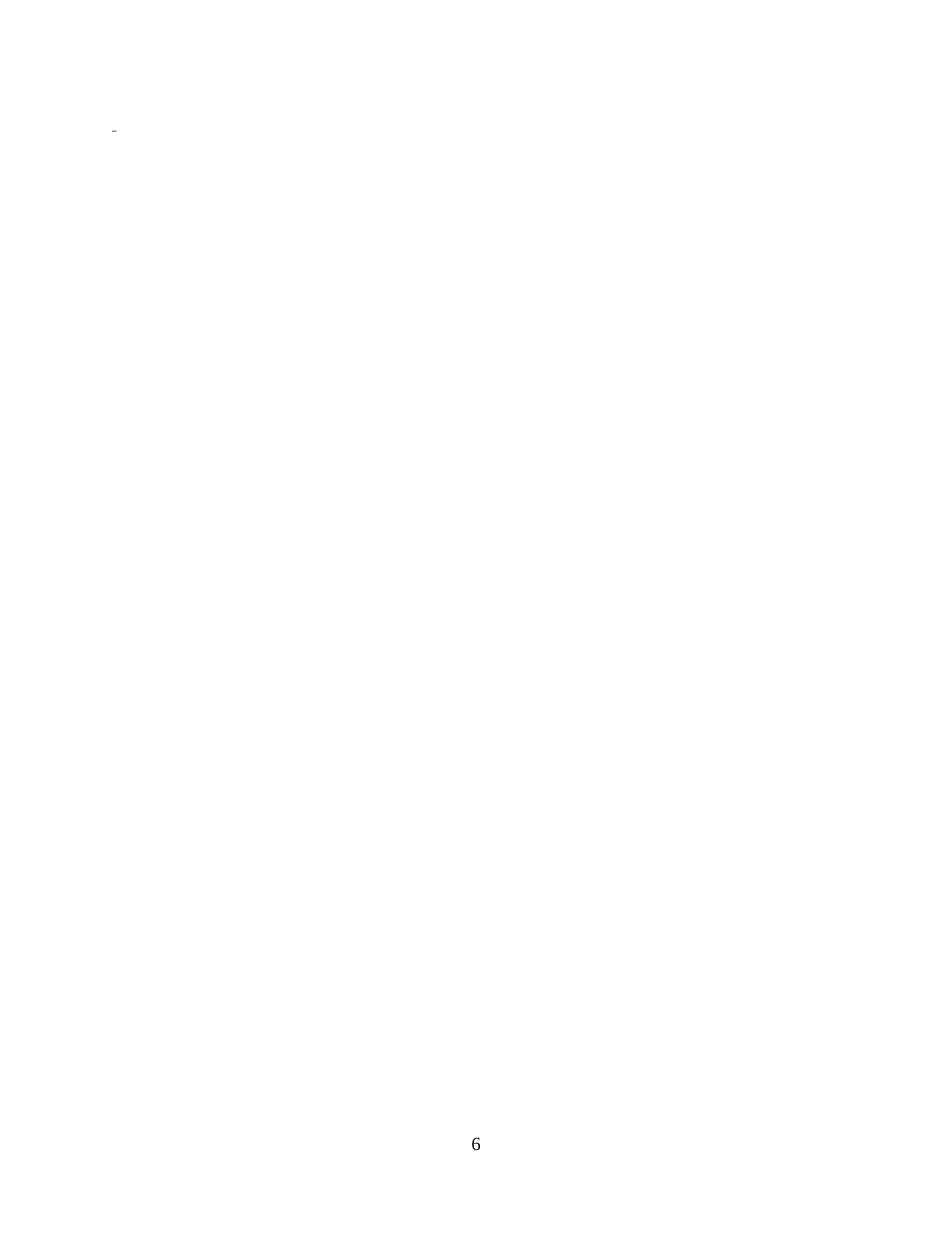
6

7
⊘ This is a preview!⊘
Do you want full access?
Subscribe today to unlock all pages.

Trusted by 1+ million students worldwide
1 out of 9
Related Documents
Your All-in-One AI-Powered Toolkit for Academic Success.
+13062052269
info@desklib.com
Available 24*7 on WhatsApp / Email
![[object Object]](/_next/static/media/star-bottom.7253800d.svg)
Unlock your academic potential
Copyright © 2020–2026 A2Z Services. All Rights Reserved. Developed and managed by ZUCOL.





